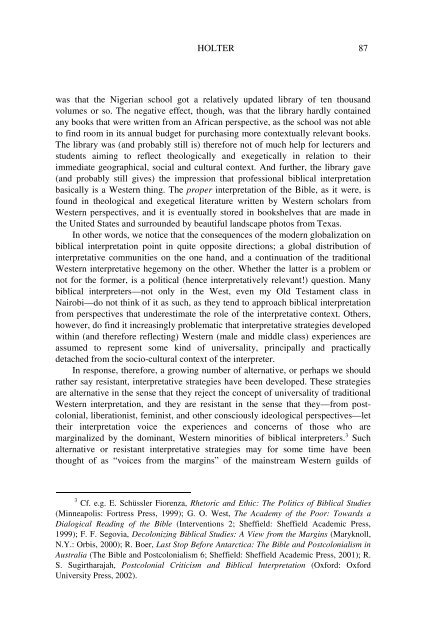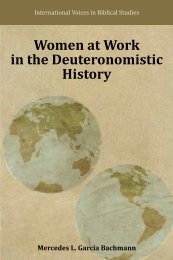Global Hermeneutics? - International Voices in Biblical Studies ...
Global Hermeneutics? - International Voices in Biblical Studies ...
Global Hermeneutics? - International Voices in Biblical Studies ...
You also want an ePaper? Increase the reach of your titles
YUMPU automatically turns print PDFs into web optimized ePapers that Google loves.
HOLTER 87<br />
was that the Nigerian school got a relatively updated library of ten thousand<br />
volumes or so. The negative effect, though, was that the library hardly conta<strong>in</strong>ed<br />
any books that were written from an African perspective, as the school was not able<br />
to f<strong>in</strong>d room <strong>in</strong> its annual budget for purchas<strong>in</strong>g more contextually relevant books.<br />
The library was (and probably still is) therefore not of much help for lecturers and<br />
students aim<strong>in</strong>g to reflect theologically and exegetically <strong>in</strong> relation to their<br />
immediate geographical, social and cultural context. And further, the library gave<br />
(and probably still gives) the impression that professional biblical <strong>in</strong>terpretation<br />
basically is a Western th<strong>in</strong>g. The proper <strong>in</strong>terpretation of the Bible, as it were, is<br />
found <strong>in</strong> theological and exegetical literature written by Western scholars from<br />
Western perspectives, and it is eventually stored <strong>in</strong> bookshelves that are made <strong>in</strong><br />
the United States and surrounded by beautiful landscape photos from Texas.<br />
In other words, we notice that the consequences of the modern globalization on<br />
biblical <strong>in</strong>terpretation po<strong>in</strong>t <strong>in</strong> quite opposite directions; a global distribution of<br />
<strong>in</strong>terpretative communities on the one hand, and a cont<strong>in</strong>uation of the traditional<br />
Western <strong>in</strong>terpretative hegemony on the other. Whether the latter is a problem or<br />
not for the former, is a political (hence <strong>in</strong>terpretatively relevant!) question. Many<br />
biblical <strong>in</strong>terpreters—not only <strong>in</strong> the West, even my Old Testament class <strong>in</strong><br />
Nairobi—do not th<strong>in</strong>k of it as such, as they tend to approach biblical <strong>in</strong>terpretation<br />
from perspectives that underestimate the role of the <strong>in</strong>terpretative context. Others,<br />
however, do f<strong>in</strong>d it <strong>in</strong>creas<strong>in</strong>gly problematic that <strong>in</strong>terpretative strategies developed<br />
with<strong>in</strong> (and therefore reflect<strong>in</strong>g) Western (male and middle class) experiences are<br />
assumed to represent some k<strong>in</strong>d of universality, pr<strong>in</strong>cipally and practically<br />
detached from the socio-cultural context of the <strong>in</strong>terpreter.<br />
In response, therefore, a grow<strong>in</strong>g number of alternative, or perhaps we should<br />
rather say resistant, <strong>in</strong>terpretative strategies have been developed. These strategies<br />
are alternative <strong>in</strong> the sense that they reject the concept of universality of traditional<br />
Western <strong>in</strong>terpretation, and they are resistant <strong>in</strong> the sense that they—from postcolonial,<br />
liberationist, fem<strong>in</strong>ist, and other consciously ideological perspectives—let<br />
their <strong>in</strong>terpretation voice the experiences and concerns of those who are<br />
marg<strong>in</strong>alized by the dom<strong>in</strong>ant, Western m<strong>in</strong>orities of biblical <strong>in</strong>terpreters. 3 Such<br />
alternative or resistant <strong>in</strong>terpretative strategies may for some time have been<br />
thought of as “voices from the marg<strong>in</strong>s” of the ma<strong>in</strong>stream Western guilds of<br />
3 Cf. e.g. E. Schüssler Fiorenza, Rhetoric and Ethic: The Politics of <strong>Biblical</strong> <strong>Studies</strong><br />
(M<strong>in</strong>neapolis: Fortress Press, 1999); G. O. West, The Academy of the Poor: Towards a<br />
Dialogical Read<strong>in</strong>g of the Bible (Interventions 2; Sheffield: Sheffield Academic Press,<br />
1999); F. F. Segovia, Decoloniz<strong>in</strong>g <strong>Biblical</strong> <strong>Studies</strong>: A View from the Marg<strong>in</strong>s (Maryknoll,<br />
N.Y.: Orbis, 2000); R. Boer, Last Stop Before Antarctica: The Bible and Postcolonialism <strong>in</strong><br />
Australia (The Bible and Postcolonialism 6; Sheffield: Sheffield Academic Press, 2001); R.<br />
S. Sugirtharajah, Postcolonial Criticism and <strong>Biblical</strong> Interpretation (Oxford: Oxford<br />
University Press, 2002).




